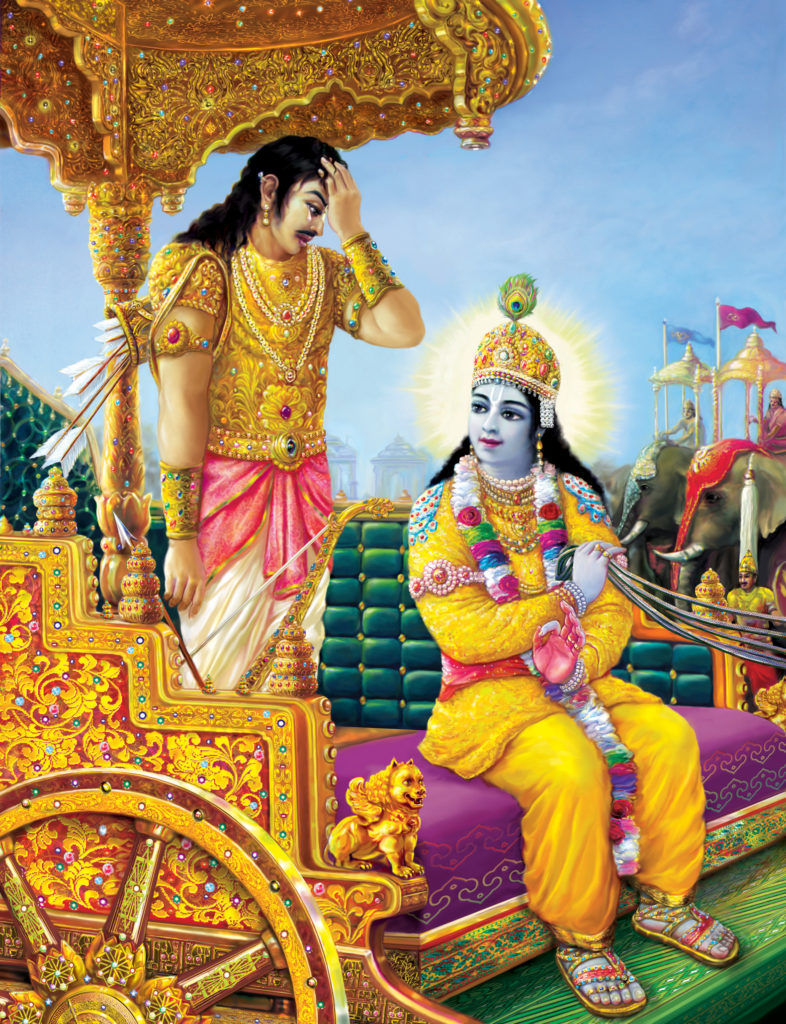Imagine you are a trained warrior, and you are about to fight in a great battle. However, as you prepare your weapons, you notice that most of your kinsmen are on the other side: cousins, uncles, dear friends, and even your grandfather. What would you do?
In the great classic, the Bhagavad-Gita, Arjuna comes across a gruesome choice: face his own relatives in battle, risking killing his own kinsman or being killed by them, or neglecting his sacred duty as a Kshatriya, a sacred warrior, and live the rest of his life in shame. For a righteous and honored person like Arjuna, dishonor is worse than death, but how could he live after the death of his relatives?

Incapable of finding a way out of his dilemma, Arjuna turns to Krsna, his divine friend, who was driving his chariot. With tears in his eyes, he begs Krsna to become his spiritual master and help him to overcome his doubts.
Them, something unexpected happens:
Instead of reflecting on mundane morality, Krsna gives him a surprising answer, bringing the conversation to a new level:
Arjuna was speaking wise words, but Krsna says that he was acting like a fool, mourning for what is not worthy of grief. Those who are wise lament neither for the living nor for the dead.
His relatives would not die in the battle, nor could he be killed. Krsna said:
“Never was there a time when I did not exist, nor you, nor all these kings; nor in the future shall any of us cease to be. As the embodied soul continuously passes, in this body, from boyhood to youth to old age, the soul similarly passes into another body at death. A sober person is not bewildered by such a change.”
One doesn’t have to fear death. Death means the destruction of the body, but we are not the body, but the soul, a particle of consciousness inside the body. The body is nothing but a machine.
What do we do if we are traveling and the car breaks? We get down and find another transportation, it’s just an inconvenience. The car depends on the driver to move, but the driver does not depend on the car to maintain his life. The car is just a tool, a tool that can be replaced.
About this, the Bhagavad-gita says: “As a person puts on new garments, giving up old ones, the soul similarly accepts new material bodies, giving up the old and useless ones”
In a battle, weapons like swords, spears, bullets, and bombs are used. However, being a non-material particle, the soul can’t be harmed by any of these weapons. The soul can’t be cut to pieces by any weapon, nor burned by fire, nor moistened by water, nor withered by the wind. The individual soul is unbreakable and insoluble, and can be neither burned nor dried. The soul is eternally existing, can live anywhere, and is unchangeable. The soul can’t be moved against his will, nor his transfer to another body can be stopped.
Great thinkers of the past attained this same conclusion after careful deliberation. When asked about where he should be buried after drinking the poison, Socrates answered: anywhere you want, but you will have to catch me first!
He understood he was not the body.
Just as one may incarcerate a man’s body, but he can’t imprison his thoughts, the same way one may kill the body, but he can’t kill or detain the soul.
In times like we are living now, when people live in fear of sickness and death, this understanding that only the body can become diseased or perish allows us to do what is needed without fear or lamentation. It gives us the strength and resolve to go through the challenges of life with a raised head, to pursue what is really important, instead of being paralyzed by fear.
I’m immortal, I’m a soul. I don’t have anything to fear. I’m unborn, eternal, ever-existing and primeval. I can’t die, even if the body is killed. Let happiness and distress come like summer and winter. I will not feel disturbed. I have a higher goal.
